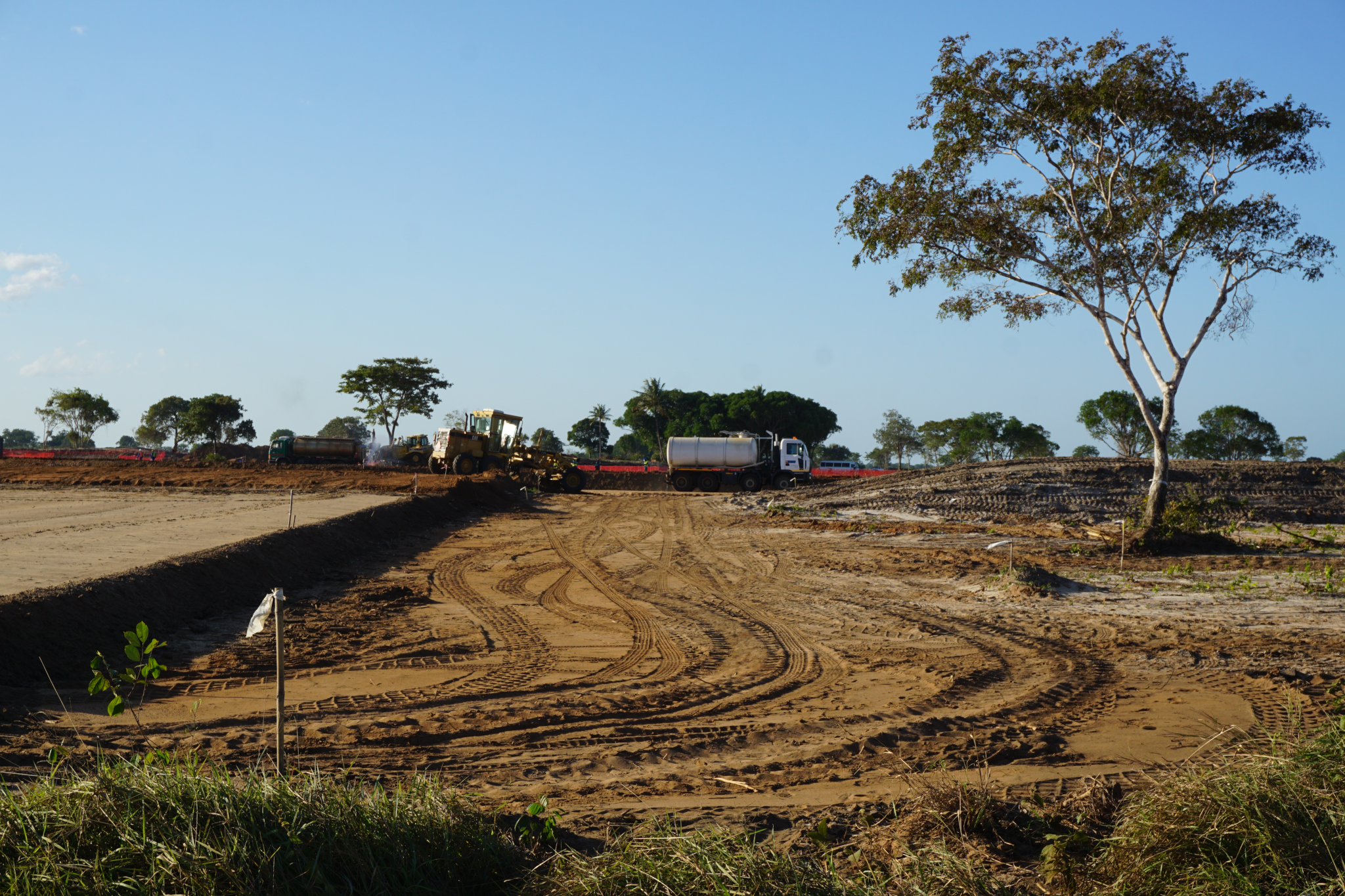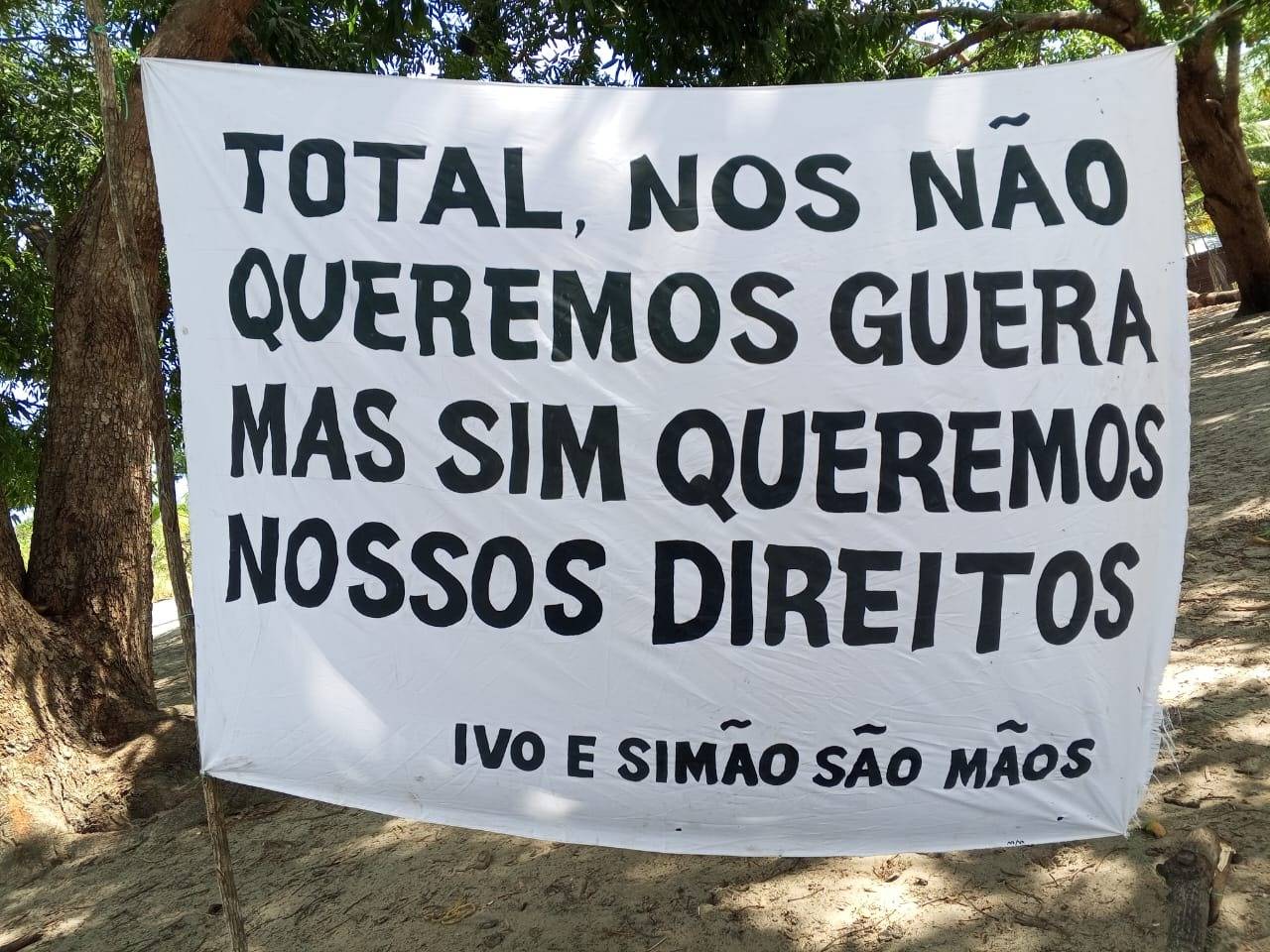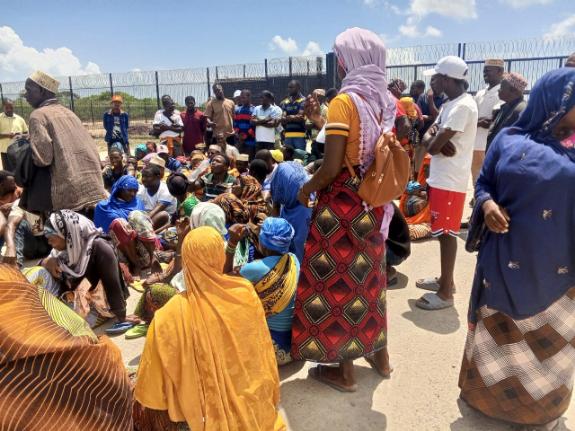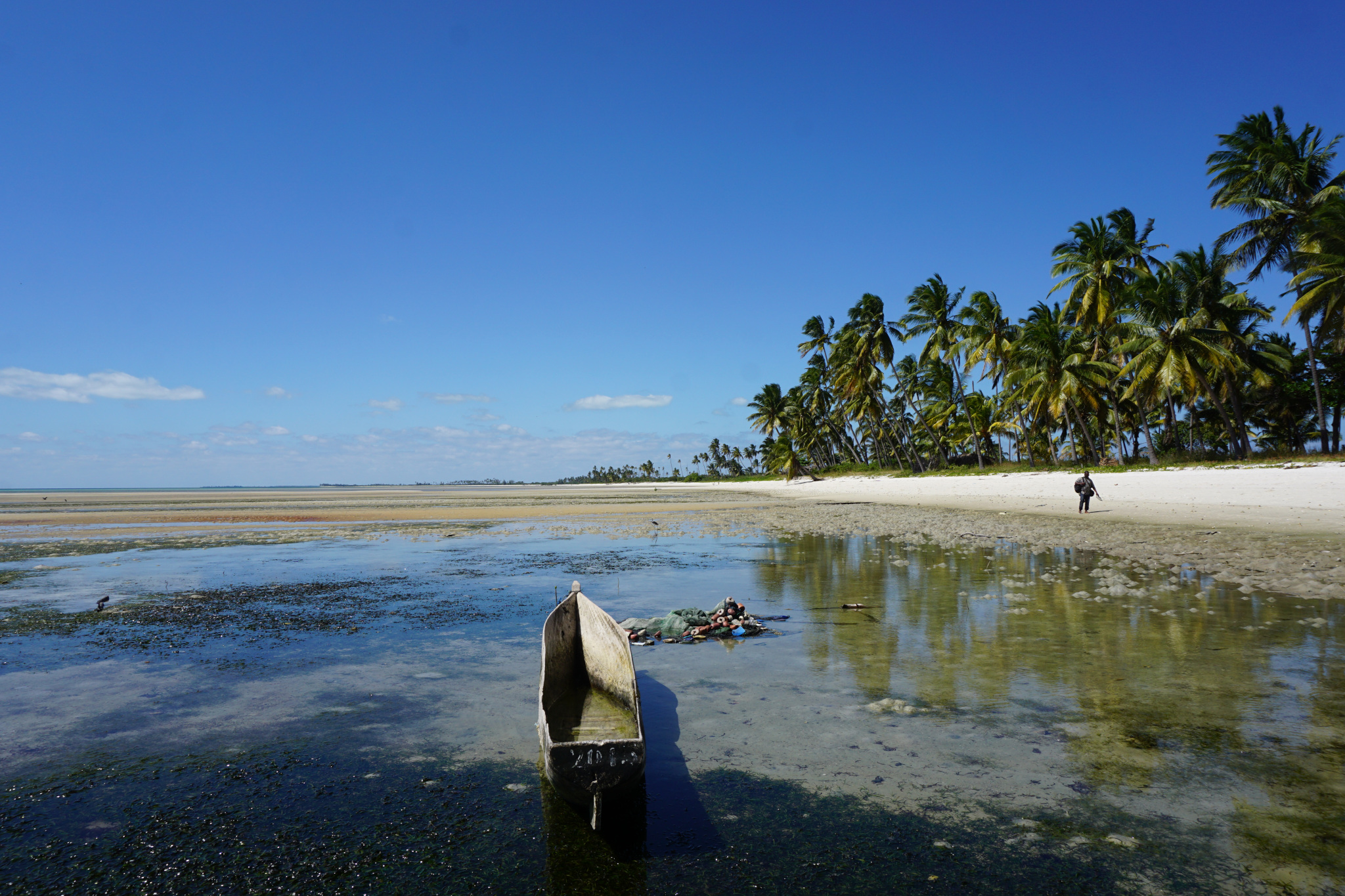Cabo Delgado, Mozambique: A Resource-Rich War Zone
Location:
Cabo Delgado, MozambiqueProject risks:
Conflict/Violence, Environmental Destruction, Social Harm, LitigationCompanies:
- Eni SpA
- TotalEnergies SE
- Exxon Mobil Corporation
- Mitsui & Co Ltd
- Empresa Nacional de Hidrocarbonetos EP (ENH)
- Japan Organization for Metals and Energy Security (JOGMEC)
- Oil and Natural Gas Corporation Ltd (ONGC)
- Oil India Ltd
- Bharat Petroleum Corporation Ltd
- PTT Exploration and Production Public Company Ltd (PTTEP)
- Abu Dhabi National Oil Company (ADNOC)
- Korea Gas Corporation (KOGAS)
- China National Petroleum Corporation (CNPC)
- Rovuma LNG SA
- Moz LNG1 Holding Company Ltd
- Bharat PetroResources Ltd (BPRL)
- PTT Public Company Ltd
Approximate location. By zooming in, you can recognize the construction site of TotalEnergies' Mozambique LNG.
External forces are tearing the Mozambican province of Cabo Delgado and its people apart. In a country that was already rife with conflict, ExxonMobil, TotalEnergies, Eni and their partners have come in to develop one of the biggest gas projects on the African continent.
Before the gas majors came, Mozambique’s Cabo Delgado province was a tourist hotspot.[1] The province lies in the North of the country, close to the border of Tanzania.[2] In the east, it borders the turquoise waters of the Indian Ocean.[3] The Quirimbas National Park, a UNESCO Biosphere Reserve, lies along the coast, onshore and off the shore.[4] Its ocean is home to sea turtles, dolphins and whales.[5] Beautiful coral reefs stretch 400 km (250 mi) along the shore.[6] On land, elephants, lions, leopards and crocodiles roam through the National Park’s ancient forests.[7] If the gas companies caused just one single accident, they could completely destabilize this biodiversity paradise.[8]
For centuries, national elites and multinational corporations have been plundering the province’s abundant natural resources.[9] Their greed for Cabo Delgado’s ruby, graphite, gold and timber has made it one of Mozambique's poorest provinces.[10][11] The people who live in Cabo Delgado have never seen any of this resource wealth. They live off farming and fishing.[12] Many people have no access to health care, education or jobs.[13]
Since their arrival in Cabo Delgado, the gas companies have only added to the woes caused by this resource curse. In 2010 and 2011, geologists found enormous fossil gas reserves off the coast of Cabo Delgado.[14] International gas companies sensed big money and immediately began investing billions of dollars.[15] Now, Cabo Delgado houses three of the largest liquefied natural gas (LNG) projects in Africa: TotalEnergies’ Mozambique LNG, Eni and ExxonMobil’s Coral North FLNG and ExxonMobil, Eni and CNPC’s Rovuma LNG are planned in the region.[16] According to the International Institute for Sustainable Development (IISD), the LNG projects have received 60 times more public finance than the entire country of Mozambique has for renewable projects.19519
Note: Reputational risk projects on GOGEL are updated annually. This article was last updated November 29 2024.

As the main operators of the gas projects in Cabo Delgado, TotalEnergies, Eni and ExxonMobil promised the people there that they too would benefit from the gas discovery.[17][18][19] Instead, the companies bulldozed their villages to make space for gas processing facilities.[20] The resettlement process for TotalEnergies' Afungi site has been underway since 2019, with the initial plan to resettle 556 families expanding over time. But few of these families have received farm land to replace their source of food and income.[21] The land that the government offered the people as compensation on behalf of the companies, is as much as ten times smaller than the land they originally owned.[22] Often, it is far away from the sea without adequate public transport to reach the coast.[23] To only get a tiny plot of land kilometers away from the coast is disastrous for people who depend on farming and fishing.[24] The communities of Macala and Mangala have made several complaints to TotalEnergies regarding these matters. In August 2024 TotalEnergies’ representatives in the resettlement area met with affected families and informed them that they would not receive compensation. This decision was made without respect or consultation with the communities, and the company did not provide a reason for the decision. In November 2024, hundreds of members from local communities staged protests against TotalEnergies’ project, tired of waiting for compensation payments or resettlement. Many have been unable to engage in subsistence farming for over a year, leaving families in extremely precarious situations.15141


With their projects, TotalEnergies, ExxonMobil and Eni pushed the people from Cabo Delgado even deeper into poverty.[26] From the very beginning, people became more frustrated for each day the gas companies stayed in Cabo Delgado.[27]
In 2017, a few years after the gas companies arrived in Cabo Delgado, insurgents began devastating the region.[30] Since then, they have been attacking the government and gas projects – but mainly civilians. They have forced people out of their villages to then burn them down.[31] Journalists report them beheading men and chopping up their bodies.[32] Insurgents have raped women in the forest and kidnapped boys to force them to join their violent groups.[33][34] In some cases, the girls they kidnap have to serve as their wives.[35] Since 2017, the insurgents have killed over 6,500 people in Mozambique.15147 Almost one million people have had to flee.15147 During their escape, thousands of children have lost their parents.[38] Many still don’t know where they are, how to find them or whether they are still alive.[39]Attacks continue to this day in northern parts of the country.195221952419525
Eni, ExxonMobil, TotalEnergies and the other gas companies are prioritizing the protection of their gas projects over people’s lives. They paid the government to mobilize troops to defend their LNG infrastructure instead of the people.15147 TotalEnergies is known to have provided food, equipment, accommodation, and personal bonuses to the Joint Task Force of the Mozambican army between August 2020 and October 2023.21464 Cabo Delgado has become a war-torn place; the people who live in the province are those who suffer most.[41] The fighting and attacks subsided in 2023 but continue to this day.2146521466 Many people are afraid to leave their homes to go to work or get food. When they do leave their homes, they often fear for their lives. Rebels could attack them or the military could mistake them for rebels and attack them.[44]

In March 2021, the violence escalated further. In their largest and most organized attack so far, hundreds of heavily armed insurgents took over the town of Palma.[45] Palma is a fishing town and the center of the gas industry.[46][47] For more than four days, the insurgents robbed food shops and banks, set fire to government buildings, burned down people’s homes and killed dozens of people.[48] Their terrorist attack displaced around 40,000 of the 75,000 people who used to live in the town.[49][50]
When the companies realized their projects were no longer safe, they immediately reacted. French energy giant TotalEnergies suspended its operations in the province.[51] France’s state prosecutor has opened an investigation into TotalEnergies for potential involuntary manslaughter and failure to assist people in danger.19237 This follows a criminal complaint made in October 2023 by families of victims and survivors of the 2021 insurgent attack on Palma town, accusing TotalEnergies of failing to ensure their safety as subcontractors.19526 TotalEnergies categorically rejects these accusations and details the emergency assistance provided by the Mozambique LNG teams and the resources they mobilized to evacuate people.21467
In September 2024, Politico reported allegations of a civilian massacre committed by armed forces near Mozambique LNG’s Afungi site.19527 The incident is reported to have occurred in July-September 2021, months after the violent insurgent attack on the town of Palma that led to increased militarization in the region and the Mozambique LNG project’s suspension. According to Politico, troops assaulted civilians who were seeking safety, imprisoned them in windowless metal containers, sexually abused women and subjected them to torture. Of about 180-250 men reported to have been detained, only 26 are estimated to have survived. The article suggests the forces responsible for these abuses were the Joint Task Force (JTF), which TotalEnergies is known to have provided supported to protect its project.1952819530 A human rights report commissioned by the company in 2023 cautioned against financially supporting the JTF, as this may render the company liable for the JTF’s conduct.21468
Le Monde and SourceMaterial have reported, based on internal communications from Total Energies’ Mozambique LNG subsidiary, that the company was allegedly aware of human right abuse accusations against the JTF between 2020 and 2022.21461 In response to the allegations TotalEnergies claims Mozambique LNG has not identified any information nor evidence that would corroborate the allegations of abuses and torture, despite having maintained channels of communication with the local communities during and after the alleged events.21460
In 2022, the gas giants began moving forward with their plans again. Eni’s massive floating liquefaction facility exported its first LNG in November 2022.12367 The company is already eyeing new projects in the country.15147 TotalEnergies has told construction companies to be ready to soon resume their work.1514715147 However, the main financial backer of the project is not sure it will follow through.15147 New attacks could delay the projects further.15147 As of Mid-2024, the attacks are on the rise again in Mozambique. Almost 100,000 people have been displaced in 2024 alone, lifting the total number of displaced from the uprising to over 700,000.19532
Throughout the week of TotalEnergies’ CEO’s visit to the area in 2023, media outlets reported three fatal attacks.15147 Overall militarization of the region will only increase as the EU seeks to protect the Mozambican gas destined for Europe.15147 For the people in the region, the return of the gas companies is no reason to celebrate. ExxonMobil, TotalEnergies, Eni and their partners will continue to trap the people in poverty, fear and violence for the sake of their own profit. Although they haven’t explicitly restarted the project, satellite imaging shows TotalEnergies and its partners have already resumed works on the site.19533
“What is happening around my islands now reminds me of events in the Niger River delta. Ever since oil was found there, the region has struggled to find peace. The environment has been destroyed and law and order has collapsed. Nowhere in Africa, have oil and gas been good for the people. I wish the gas had never been found."
Issa Tarmamade, mayor of the Ibo island district in Cabo Delgado.15147
Groups working on gas in Cabo Delgado: Justiça Ambiental! (Friends of the Earth Mozambique), Friends of the Earth International, Les Amis de la Terre France, EWNI (Friends of the Earth England, Wales and Northern Ireland), Milieudefensie (Friends of the Earth Netherlands), Re:Common, Friends of the Earth US, Gastivists
Parts of the information presented in this text and in the sources has been collected and investigated by Friends of the Earth Mozambique / Justiça Ambiental! who work closely with communities in Cabo Delgado, Mozambique.
Sources: